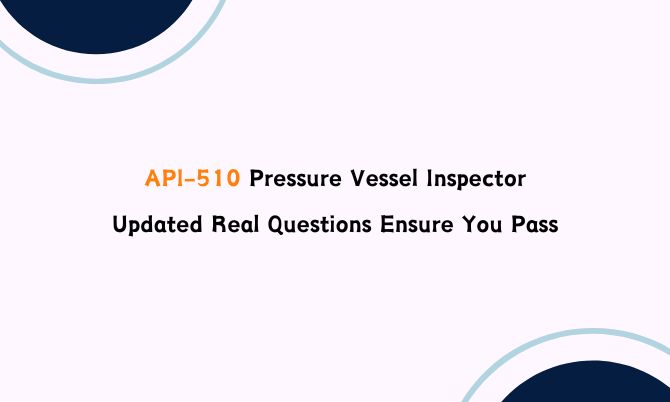The API-510 Pressure Vessel Inspector certification is a well-regarded credential that certifies professionals who possess a broad and comprehensive knowledge base in the critical areas of maintenance, inspection, repair, and alteration of pressure vessels. This certification program is meticulously designed to ensure that inspectors are well-equipped with the necessary skills and expertise required to perform their duties effectively. Achieving this certification not only provides significant benefits to individual inspectors by advancing their careers and professional standing, but it also plays a pivotal role in enhancing the overall safety and operational efficiency of the entire industry. By ensuring that pressure vessels are maintained and inspected to the highest standards, certified inspectors contribute to the prevention of accidents and the optimization of industrial processes.

Obtaining the API 510 certification offers several advantages:
Enhanced Management Control: Certified inspectors contribute to better management of process unit operations, repair, and maintenance.
Reduction in Inspection Delays: With certified inspectors, the likelihood of delays due to inspection issues is significantly reduced.
Improved Safety Standards: Certified inspectors are highly specialized and experienced, ensuring continued high levels of safety in operations involving pressure vessels.
This certification is accredited by the American National Standards Institute (ANSI), ensuring that it meets the rigorous standards established under the International Organization for Standardization (ISO) 17024. The certification is valid for a three-year term, after which recertification is required.
The API 510 exam is structured to assess both closed-book and open-book knowledge:
Duration: The API 510 exam day lasts 7.5 hours, including a short tutorial session, a 2.75-hour closed-book portion, a 45-minute lunch break, and a 3.75-hour open-book portion.
Number of Questions: The exam consists of 170 questions, of which 140 are scored. The remaining 30 are pretest questions used to evaluate new questions for future exams.
Question Distribution: There are 110 closed-book questions and 60 open-book questions.
To ensure you are comfortable with the exam format, it is recommended to view the Exam Tutorial available on the API website.
Preparing for the API 510 exam requires a strategic approach to ensure a comprehensive understanding of the material and effective time management. It is crucial to begin by thoroughly reviewing the sections of publications listed in the Effectivity Sheet and the topics in the Body of Knowledge, as these areas form the core of the exam content. Utilizing various study materials, such as textbooks, online resources, and training courses, can provide a well-rounded preparation. Additionally, taking practice exams can be highly beneficial in familiarizing yourself with the exam format and identifying areas that need further study. Managing your study time effectively is also essential, as the exam includes both closed-book and open-book portions. Developing a strong grasp of the material will not only help in answering closed-book questions but will also enable you to efficiently navigate the open-book section within the allotted time.
Study the Right Material: Focus on the sections of publications listed in the Effectivity Sheet and the topics in the Body of Knowledge.
Practice Time Management: Given the extensive nature of the exam, practicing time management during your preparation can be very beneficial.
Utilize Real Updated Questions: Taking API 510 real updated questions can help you become familiar with the question format and identify areas where you need further study.
Prepare for Both Closed-Book and Open-Book Questions: While the open-book section allows for reference materials, it's essential to have a strong understanding of the content to manage time effectively.
The API 510 Pressure Vessel Inspector certification is a vital credential for professionals in the field of pressure vessel inspection. By ensuring a high level of expertise and knowledge, this certification contributes significantly to the safety and efficiency of industrial operations. Preparing thoroughly by reviewing the Publications Effectivity Sheet and Body of Knowledge, and understanding the exam structure, will help candidates succeed in obtaining this respected certification.